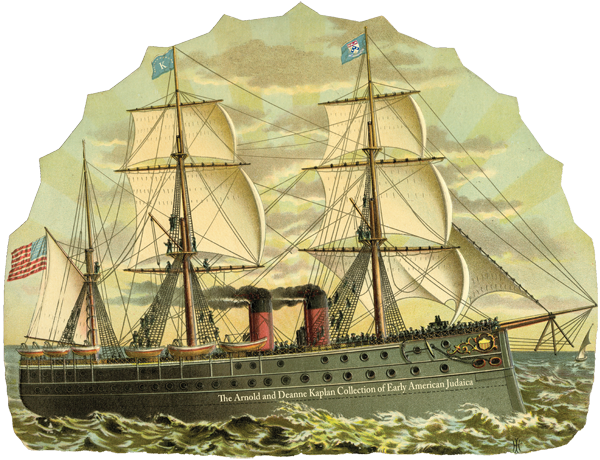Processing the Collection
The overall Kaplan gift of items to the University of Pennsylvania Libraries can be divided into three separate collections:
- Early American Judaica (the core collection)
- Modern American Judaica
- Non-Judaica Americana
The Kaplan Collection of Early American Judaica
The Kaplan Collection of Early American Judaica that will be discovered online in Colenda is one that Arnold Kaplan thoroughly vetted and curated in an effort to define a field of study in time and space, i.e., temporally and geographically, through the vehicle of the Kaplan collection.
Not included in the collection of Early American Judaica In the course of their lives collecting together, the Kaplans acquired many items that today are outside the temporal and geographical scope of their core collecting focus on pre-mass migration American Jewish history. To sharpen the intellectual parameters and historical character of the collection of early American Judaica (the core collection), Arnold Kaplan has tirelessly reviewed every item he original donated. His main criteria for removal of items from the core collection were:
- items of Judaica Americana too late to be included in the core collection of early American Judaica;
- items of Judaica not related to American Jewish history at all;
- items originally thought to be Judaica, but later discovered not to be, such as documents relating to David Kaufmann, the Texas politician and U.S. Congressional representative. After thoroughly researching the matter, Mr, Kaplan conclusively determined that Kaufman in fact was not Jewish which is the the current scholarly consensus. The Kaplan Collection of Early American Judaica is now discoverable online and viewable in its entirety in Colenda, the Penn Libraries’ secure digital image repository. The online “Early Kaplan” collection does NOT include thousands of items from the original gift deemed outside the scope of the Kaplan Early American Judaica collection criteria.
To process, catalog, scan and put online a collection of this size and complexity, while addressing the urgent scope and content parameters requirements, required a team of skilled professionals over several years. Their combined efforts, in regular consultation with Mr. Kaplan, led to the development of new workflows, new categories of materials, and alternative locations for all removals.
The Arnold and Deanne Kaplan Collection of Modern American Judaica
Excluded items which post-date the periodization of the Kaplan Collection of Early American Judaica (through 1890) are now grouped under the heading “The Arnold and Deanne Kaplan Collection of Modern American Judaica”. The Kaplan “Modern” American Judaica collection, therefore, and in contrast to the Kaplan “Early” American Judaica collection, consists of items that date from after 1890.
Exceptions: there are important exceptions to this core collection periodization which are important to keep in mind when searching and viewing the ‘early” Kaplan collection. Some documents from the American Far West which date from the 1890s are considered and included as part of the “early” Kaplan Collection in that they still are seen as belonging to a pioneer experience of Jewish settlement.
Non-American Judaica Kaplan gifts
The dozens of works of Judaica without any connection to the American experience have been removed and cataloged as individual gifts made by the Kaplans to the Penn Libraries. These occasional items of non-American Judaica given by the Kaplans do NOT form a separate, named Kaplan collection. Instead, they may be discovered individually by searching the Penn Libraries’ online public catalogue, Franklin. They will not be found by searching the Kaplan Early American Judaica Collection.
Non-Judaica Kaplan gifts
Hundreds of items identified as non-Judaica, mainly Trade Cards, also have been removed from the original gift collection. Instead, they have been accessioned individually and are discoverable in the online catalog with provenance notes in the cataloging record noting that they are gifts of the Kaplans.
The Arnold and Deanne Kaplan Collection of Americana (non-Judaica)
The Kaplans also deliberately collected over the years many non-Judaica historical documents and works of art. In 2012, the Kaplans donated one such collection of (non-Judaica) Americana to the Penn Libraries. The Kaplan Americana collection consists of six linear feet of manuscripts and photographs. The manuscript types include account books, ciphering books, diaries, letter books, penmanship notebooks, and recipe books. The photographs all come from the educational department of the Philadelphia Commercial Museum.
The Kaplan collection of Americana is divided into two series: manuscripts and photographs. The manuscripts are further divided by function: account books, ciphering books, diaries, letter books, penmanship notebooks, and recipe books. The photographs all come from the educational department of the Philadelphia Commercial Museum.








